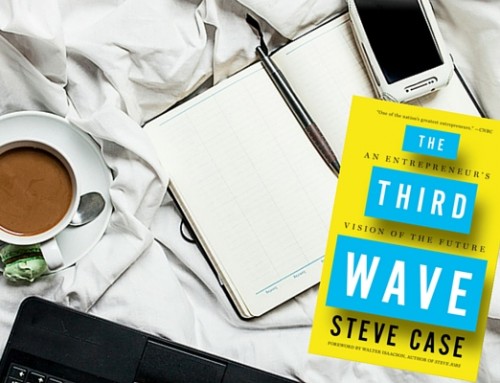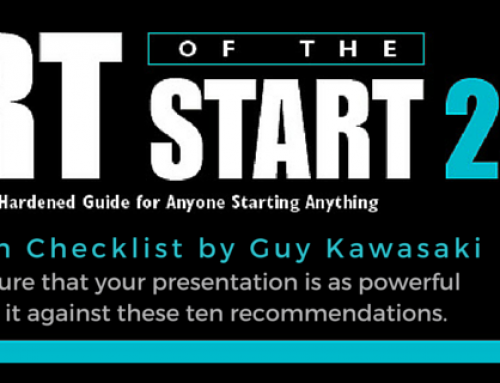At any conference, there are ten times more panelists than there are keynote speakers, so the odds are higher that you’re on a panel than giving a keynote speech. Therefore, rocking a panel is an important skill for evangelists, too.
A panel looks easy. There are four or five other people on it, and it lasts only sixty minutes. How hard could it be? Herein lies the problem: because everyone thinks a panel is short and easy, no one prepares for it. In reality, a panel is harder than an individual speech because you cannot control a panel like your own keynote speech, and you get much less air time.
This is what to do if you want to be the person everyone comes up to talk to after a panel:
- Know the subject. If you’re invited to a panel about a subject that you don’t know, decline the invitation. I don’t care how wonderful the opportunity seems to be. If you can help it, never provide a way for people to learn that you’re clueless.
- Control your introduction. The first mistake that most panelists make is assuming that the moderator has an up-to-date and accurate bio. The moderator either knows nothing about you or has done a cursory Google search and found a bio that is incorrect. Therefore, before the panel starts, hand the moderator a three-sentence bio and ask her to read it verbatim.
- Speak up. The optimal distance between your lips and the microphone is one inch. This is because you’re sitting down, you’re hunched over, and you’re not projecting. So get close to the mike and speak up. Make love to the microphone.
- Entertain, don’t just inform. As in keynotes, your primary goal is to entertain, not inform. The funnier you are, the more people will think you’re smart because it takes intelligence to be funny. I’d go so far as to pick a friendly fight with the moderator or another panelist. Have fun.
- Tell the truth, especially when the truth is obvious. If you’re lucky the moderator will try to provoke you with tough questions. This is good thing because it provides an opportunity to be (a) funny and (b) a straight shooter. “The truth will get you glee.” If everybody knows the truth, don’t try to lie. It would be far better to say, “I take the Fifth Amendment.” At least that will get a laugh.
- Answer the question that’s posed, but don’t limit yourself to it. When asked a question, answer it as quickly as possible, but then feel free to take the conversation in the direction you want it to go. For example, let’s say that the moderator asks, “Do you think smart phones will get viruses soon?” It’s okay to answer, “Yes, I think this is an issue, but the real issue is the lack of good cell phone coverage,” if that’s what you want to talk about.
- Be plain, simple, and short. Let’s assume you are on a panel of experts. Let’s further assume the moderator is an expert. The moderator asks a question. You direct your answer to her and to the other panelists—all experts, so you launch into an alphabet soup, acronym du jour response. Big mistake. The audience is the audience, not the moderator, nor the panelists. Reduce the most complex and technical issues to something plain, simple, and short, and you’ll stand out.
- Fake interest. This may be one of the hardest aspects of a panel. Let’s say the other panelists are in the middle of a long, boring, jargon-filled response. The temptation is to check email or resist looking bored. Don’t do it. Fake rapt interest because the moment you look bored, a photographer is going to snap a picture or the cameraman is going to put your face on the fifty-foot screen.
- Never look at the moderator. The moderator is a proxy for the audience. When you answer, look at the audience because the audience doesn’t want to see the side of your head. (FYI, a good moderator will not make eye contact with you—forcing you to look away from him and toward the audience.)
- Never say, “I agree with the previous panelist.” A moderator will often ask everyone on a panel to answer the same question. If you’re not the first to reply, there’s a temptation to say, “I agree with what my colleague just said…” That’s a dumbass response. Come up with something different, or, say, “I think that question has been answered. For the audience’s sake, let’s move on.”
This post is a tiny part of Guy Kawasaki’s latest book, The Art of the Start 2.0. Read it and reap…



As is usual, Guy knows his stuff – and while I’ve never heard him on one, I do know personally his keynote ability is unbounded….so this article will serve me well as I’m going to be on a local SEO panel in the summer! Thanks Guy…muchly appreciated, eh! :-)
And sign The Pledge! (I will not be part of male-only panels) http://www.owen.org/pledge
What, why? If women (myself included) want to be treated as equals to men (not the same, just of equal value), then this is counterproductive thinking. True egalitarianism will never be possible so long as we focus on disparity like this. I say, the people who should be on any panel are either:
a) those who deserve to be, by right of their expertise and knowledge of a subject (and perhaps, in deference to Guy’s point above, how engaging s/he is as a speaker); or
b) those who have had the foresight and ambition to put themselves in front of those making the selection decisions.
Refusing to participate in a panel simply because there isn’t a “fair and equitable” distribution by gender is so shortsighted it has more potential to HARM the efforts of women than to help it.
Imagine yourself a paying attendee at a panel. Wouldn’t you want the panel to consist of the people – whatever gender – who are most qualified and capable in the subject at hand in order to realize the full potential value of your investment??
Great tips! My first speaking opportunity was a panel – it feels like it would be easier than having the floor to yourself, but in some cases, it’s not.
Thanks for sharing this excerpt from your book. I’ve been on numerous panels and even done keynotes, but never realized how important it is to “Control My Introduction.” I can’t tell you how many times on the day of the event, that I’ve been asked for a bio and I’ve emailed a full page document. Then, the person who gives my introduction, invariably, flubs and I think to myself, “What in the world?”
However, from this point forward, I will have a ready-made 3-sentence-introduction to take control of my introduction. I believe this is helpful not only for panels but for keynotes as well. Is anything worse than someone introducing you and while they’re talking you’re wondering who they are speaking of?
Thanks again, perhaps, I should read the whole book!!! I’m such a fan of yours! http://www.yasminshiraz.net/blog
This is great, I like the fake interest that was funny for me because I easily bored by the conversation that goes no where or ones that are overly self- promoting. But great article.
Thanks for posting this beautiful article, I would like to appritiate Mr. Guy Kawasaki for his writing skill. My first experience of writing and speaking was also a panel. Thats why this article drag me to the past in that panel.
This is great insight to have! Thanks for sharing these great tips. Great stuff for getting started.
I think so too, i’d even bet that these have some great public speaking tips in here too. Fantastically crafted article. I have a thing or many to learn yet! (Is fantastically a word?)
Great post Guy!
It was very much helpful going through all the tips that you have shared Mr. Guy I would like to add a small point to it, like drop in a ocean, Good or professional or casual with suitable prints or shades outfit will have the eye catchy impression through out the panel meeting.
canva is an awesome platform, didn’t know it was connected to Guy Kawasaki – no wonder it is so good!
Gary